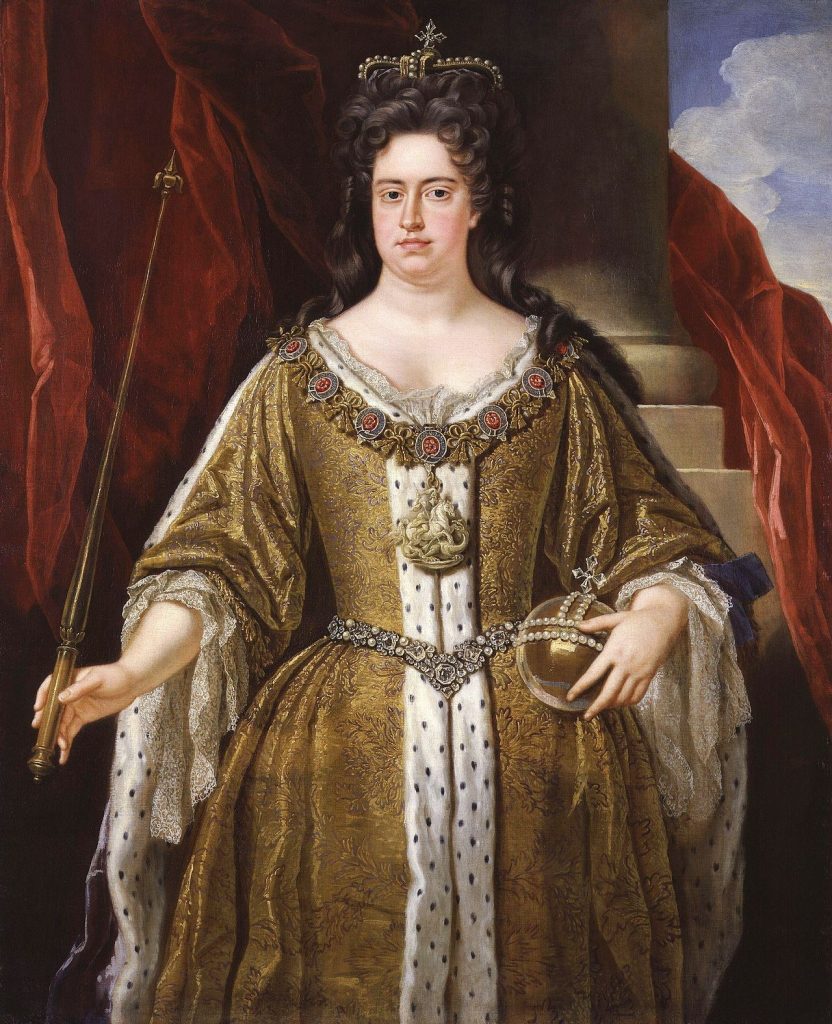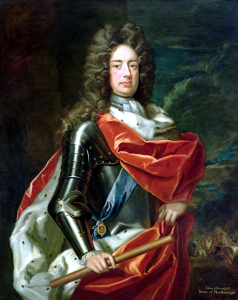
Finest Hour 184
Queen Anne

Queen Anne (reigned 1702–1714)
July 10, 2019
Finest Hour 184, Second Quarter 2019
Page 07
By Winston S. Churchill
Queen Anne is dead; but her contribution to British history abides with us today. The reign of Queen Elizabeth I saw a little England divided and harassed, escaping a grisly hazard from the destruction which would have been also fatal to Protestant and rationalist civilization.
This article first appeared in the Evening Standard of 1 May 1937.
Queen Anne presided over, and at moments decisively aided, the rise of England to a united Britain and to the leadership of the European continent. That leadership was not permanently held, but never since the reign of Anne has Great Britain ceased to be one of the leading nations of the world.
This reign also is capital in its influence on Parliamentary government as it was to flourish for two hundred years. The development of the party system, the collective responsibility of the Cabinet, the obligation of the Crown to receive not only policies but Ministers in accordance with the wish of the House of Commons, were milestones comparable in achievement with the Union with Scotland.

2024 International Churchill Conference
Anne was the inheritor of William III. She had good reason to dislike him—Caliban, as she called him. Her quarrels with him and with her sister, Queen Mary II, were on both sides sharp and scandalous. But William was master and the Princess Anne sheltered in the Cockpit (where the Treasury Chambers now stand) with a handful of friends and attendants of whom John Churchill, afterwards Duke of Marlborough, and his wife Sarah were the most prominent.

To this circle she added [Lord] Godolphin, who in the spirit of a modern civil servant, served with equal fidelity and impeccability, Charles II, James II, William III and Anne.
This small group lay under the frown of power in William’s reign, Godolphin being their only link with the official world. They were welded together by common resentments and adversity. But after the death of Queen Mary left the Princess Anne the direct heir to the Throne, the King altered his attitude. His health was failing, his life precarious. Anne was his certain successor.
The Marlboroughs were regarded as most able, forceful and unscrupulous. Their influence over the future Queen seemed absolute. Marlborough already gleamed through clouds of hostility and prejudice as the commanding personality, a competent general and astute politician.
The historic quarrel of the Spanish Succession reached the verge of war as William lay dying. On his deathbed he bequeathed the Protestant cause and the resistance of Europe to the overweening might of France to his successor, and he advised her, in spite of his personal animosities, that Marlborough was the man most fitted to guide her councils and to lead her armies.
The accession of the new Queen was naturally the signal for an outburst of loyalty. She was English, she was Protestant, and, although a Tory, had been an energetic supporter of the “the great and glorious revolution of 1688.” She had preferred, it was said, her religion to her father, and set her country and her duty before her family affections.
There is no doubt she had acted with conviction and sincerity in this crisis. Neither is there any doubt that she was surely guided by Marlborough’s statecraft and the influence of her dear friend, Sarah, the heroine of her childhood, companion of her prime, and now the Mrs. Freeman of their celebrated informal correspondence.
There was general agreement throughout the nation that England should with all her might fight against Louis XIV and France, and head whatever coalition could be formed against French and Popist domination.
Marlborough, under William III, had negotiated the Treaties which formed the Grand Alliance. Under Queen Anne he led its armies in the field. Immediate success attended the war. Those who feared they would be downtrodden at the outset by the massive military despotism of the Sun King found that they were in a struggle in which the two sides were evenly matched.
But 1703, the second year of the war, proved the enormous advantages which a central power directed by a single hand had over a heterogeneous circle of loosely-knit allies. It was at this moment when Marlborough and Treasurer Godolphin, bent evidently under their burden, that Queen Anne wrote the letter upon which more than on any other action of her reign, her glory stands. She animated her friends and counselors. “We four,” she wrote, meaning herself, Marlborough, Sarah and Godolphin, “must never part till death mows us down with his impartial hand.”
Thus animated, Marlborough set forth through measureless toils and hazards upon his march across Europe to the rescue of Vienna. In August, 1704, the decisive battle of Blenheim raised the England of Queen Anne to the leadership of a victorious Grand Alliance.
While these great events swelled throughout Europe and Queen Anne’s general led her redcoats and the allied armies to Ramillies and Oudenarde, the power and prestige of England bulked so large that the Union with Scotland was carried through, and the wealth of the city of London developed to the amazement of contemporaries that system of credit which seemed to produce effective wealth by a magic wand.
The years 1708, 1709 and 1710 saw the small England so recently a pensioner of France, feared, admired, respected and almost obeyed over the greater part of the continent of which she had seemed so small a fraction.
Meanwhile the Queen upon her throne presented a compulsive study for analysts of character and motive. There she sat, the main obstacle to the Jacobites, yet she herself far more a Jacobite than many who were sent to prison by her Governments.
She had never really believed in the imposture that her brother “the pretended Prince of Wales” had been smuggled in a warming-pan into the Royal bed. “Maybe ’tis our brother. Where one believes it a dozen or not.” Such was her attitude at the peak of the Revolution of 1688. But once passions had cooled she yielded herself to the private view of the ruling classes that the exiled prince, though banned in law, was the undoubted son of her father.
Therefore, Anne ascending the Throne in real satisfaction had always nevertheless a grievous prick of conscience, that she had been false to her father and was defrauding her family. She feared devoutly that God would visit this upon her, and when, as is currently declared, she endured the burial or disappointment of seventeen children, she bowed as to a punishment from on high.
She could never have sustained this internal stress if her natural good sense had not been fortified first by the influence and counsel of the Marlboroughs, second by the dazzling victories which raised her realm so wonderfully above the proudest dreams, and thirdly, probably most potent of all, by her profound attachment to the principles of the High Episcopal Church of England. This she had deep rooted in her being.
The Queen walked in confident step along that causeway which built itself before her feet and stood between Popery and subjugation by France on the one hand, and Republicanism, Dissent and Atheism on the other. She never quitted this causeway for one moment in her reign, and today, when we have disputes about tithes, Queen Anne’s Bounty and the like, we see her footprints.
Anne was resolved to be Queen while the breath was in her body, and after Blenheim none could doubt that the England she led and the servants she commanded were unconquerable. But who was to succeed her? And in this the struggle in her bosom reached its agony. The fierce parties fought and intrigued around her. But who was to have this great England that had presented itself to Europe behind Marlborough’s sword?
Was it to be the dull Hanoverian backed by the Queen’s aversion, the Whigs; this former suitor to her hand who in her maiden days had looked her over and turned her down; this friend of all those in England who stood to reduce its Church to the little bethels of Presbytery and Dissent; or was it to be her own brother, the distant, romantic figure, against whom she had warred, but from whom her innate sympathies had never been divorced?
Hers was a reign of splendour. The age of Anne is celebrated as the Augustan age in English literature. The efflorescence of English genius in so many directions was deemed remarkable by all the world. But physical ailments, much futile child-bearing, the mental stresses of everyday affairs, of which she was the focus, had worn her down. The last four years of Anne saw a painful weakness and deterioration in the Sovereign and also, it must be added, in most of those who surrounded her.
She broke with the Marlboroughs. She intrigued against her Ministers and the majorities they held in Parliament. She deserted her Allies in the open field. She forced a separate peace. She sat impassive while the great man who had made her reign was driven into exile. She seemed so completely to have abandoned the British, European and world causes she had championed since 1688, that as she sank towards her final end it almost seemed that her death would be the signal for civil war.
Once again the two Englands and the two Scotlands of those days faced each other with clear readiness to put their convictions to the proof. But with her dying hand, however her failing intelligence may have been gripped or guided, Queen Anne passed the White Staff to Lord Chamberlain Shrewsbury “to use for the good of her people,” and thus the continuity of British Protestant history, which had survived indescribable perils since the days of Henry VIII, was preserved to light the British Empire down to this very day.
Subscribe
WANT MORE?
Get the Churchill Bulletin delivered to your inbox once a month.




